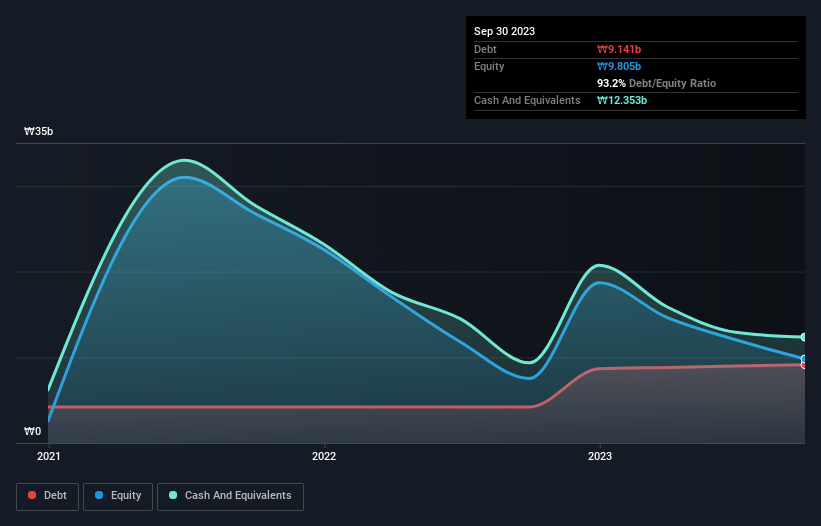- South Korea
- /
- Medical Equipment
- /
- KOSDAQ:A338220
Vuno (KOSDAQ:338220) Has Debt But No Earnings; Should You Worry?
Howard Marks put it nicely when he said that, rather than worrying about share price volatility, 'The possibility of permanent loss is the risk I worry about... and every practical investor I know worries about.' It's only natural to consider a company's balance sheet when you examine how risky it is, since debt is often involved when a business collapses. As with many other companies Vuno Inc. (KOSDAQ:338220) makes use of debt. But the real question is whether this debt is making the company risky.
When Is Debt A Problem?
Debt and other liabilities become risky for a business when it cannot easily fulfill those obligations, either with free cash flow or by raising capital at an attractive price. If things get really bad, the lenders can take control of the business. However, a more usual (but still expensive) situation is where a company must dilute shareholders at a cheap share price simply to get debt under control. Of course, plenty of companies use debt to fund growth, without any negative consequences. When we examine debt levels, we first consider both cash and debt levels, together.
View our latest analysis for Vuno
What Is Vuno's Debt?
As you can see below, at the end of September 2023, Vuno had ₩9.14b of debt, up from ₩4.20b a year ago. Click the image for more detail. But it also has ₩12.4b in cash to offset that, meaning it has ₩3.21b net cash.

How Strong Is Vuno's Balance Sheet?
According to the last reported balance sheet, Vuno had liabilities of ₩14.4b due within 12 months, and liabilities of ₩2.52b due beyond 12 months. Offsetting this, it had ₩12.4b in cash and ₩2.74b in receivables that were due within 12 months. So its liabilities outweigh the sum of its cash and (near-term) receivables by ₩1.85b.
Having regard to Vuno's size, it seems that its liquid assets are well balanced with its total liabilities. So it's very unlikely that the ₩405.2b company is short on cash, but still worth keeping an eye on the balance sheet. While it does have liabilities worth noting, Vuno also has more cash than debt, so we're pretty confident it can manage its debt safely. There's no doubt that we learn most about debt from the balance sheet. But ultimately the future profitability of the business will decide if Vuno can strengthen its balance sheet over time. So if you want to see what the professionals think, you might find this free report on analyst profit forecasts to be interesting.
In the last year Vuno wasn't profitable at an EBIT level, but managed to grow its revenue by 364%, to ₩15b. That's virtually the hole-in-one of revenue growth!
So How Risky Is Vuno?
Statistically speaking companies that lose money are riskier than those that make money. And we do note that Vuno had an earnings before interest and tax (EBIT) loss, over the last year. Indeed, in that time it burnt through ₩15b of cash and made a loss of ₩8.8b. With only ₩3.21b on the balance sheet, it would appear that its going to need to raise capital again soon. Importantly, Vuno's revenue growth is hot to trot. High growth pre-profit companies may well be risky, but they can also offer great rewards. There's no doubt that we learn most about debt from the balance sheet. However, not all investment risk resides within the balance sheet - far from it. For example - Vuno has 4 warning signs we think you should be aware of.
At the end of the day, it's often better to focus on companies that are free from net debt. You can access our special list of such companies (all with a track record of profit growth). It's free.
New: Manage All Your Stock Portfolios in One Place
We've created the ultimate portfolio companion for stock investors, and it's free.
• Connect an unlimited number of Portfolios and see your total in one currency
• Be alerted to new Warning Signs or Risks via email or mobile
• Track the Fair Value of your stocks
Have feedback on this article? Concerned about the content? Get in touch with us directly. Alternatively, email editorial-team (at) simplywallst.com.
This article by Simply Wall St is general in nature. We provide commentary based on historical data and analyst forecasts only using an unbiased methodology and our articles are not intended to be financial advice. It does not constitute a recommendation to buy or sell any stock, and does not take account of your objectives, or your financial situation. We aim to bring you long-term focused analysis driven by fundamental data. Note that our analysis may not factor in the latest price-sensitive company announcements or qualitative material. Simply Wall St has no position in any stocks mentioned.
About KOSDAQ:A338220
Vuno
Operates as a medical artificial intelligence (AI) solution development company.
Exceptional growth potential with excellent balance sheet.
Market Insights
Community Narratives




